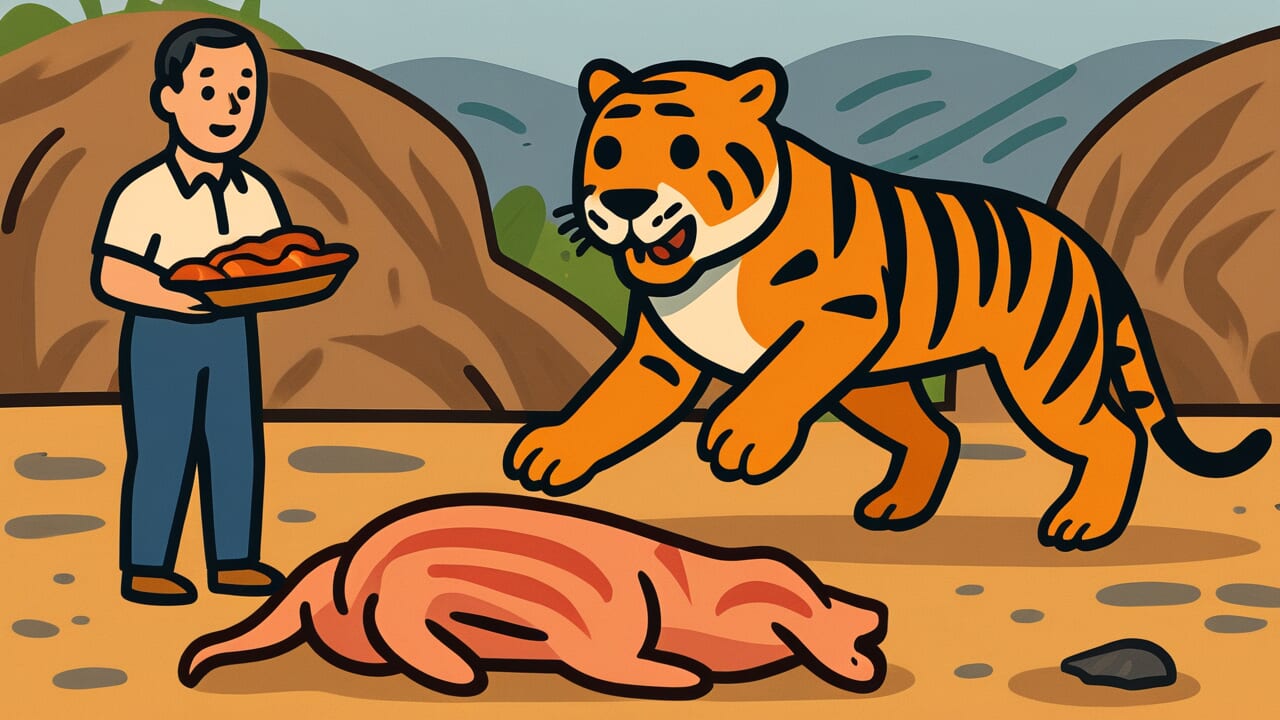How to Read “A tiger will not eat carrion even when starving”
Tora wa uete mo shishitaru niku wo kuwazu
Meaning of “A tiger will not eat carrion even when starving”
This proverb means that proud people will not resort to shameful methods even when facing hardship.
No matter how difficult the situation becomes, people with strong principles refuse to gain profit through dishonest means.
They will not take actions that damage their dignity as human beings.
People use this saying to praise those who maintain honesty despite economic difficulties. It also applies to people who resist temptation and protect their beliefs.
Sometimes people say it to themselves as a reminder. It contains a warning that difficult times truly test a person’s character.
In modern times, this proverb supports us when we might drift toward easy paths.
It teaches the importance of protecting our pride and dignity with a long-term perspective. We should not compromise for immediate benefits.
This wisdom continues to live on today.
Origin and Etymology
The exact source of this proverb has several theories. However, it likely comes from the ideal image of a “gentleman” in classical Chinese thought.
The dignity and pride of the tiger has traditionally symbolized noble human spirituality.
Tigers have been symbols of strength and dignity as the king of beasts since ancient times.
Even such a tiger, no matter how hungry and suffering, will not touch the meat of already dead animals.
This observation forms the core of the proverb.
The actual ecology of tigers may not be entirely accurate here. What matters is the ideal image placed upon the tiger.
“Carrion” means something not obtained through one’s own hunting. In other words, it represents leftovers from others.
By extension, this symbolizes profits gained through dishonest means or shameful methods in human society.
No matter how desperate the situation, maintaining pride and dignity is true strength. This value is embedded in the proverb.
This saying connects with bushido spirit and Confucian thought that values righteousness.
It reflects traditional Japanese values that honor spiritual nobility over material wealth.
Interesting Facts
Tigers actually do eat carrion sometimes. However, this proverb prioritizes the noble image of tigers.
Animals in proverbs emphasize the images and symbolism people hold. Biological accuracy is not always the priority.
This is a perfect example of that principle.
Japan’s samurai class valued the spirit of this proverb as an actual code of conduct.
Samurai took pride in not borrowing money or accepting charity even when poor.
Their attitude embodied the way of life this proverb expresses.
Usage Examples
- His company went bankrupt and he faced hardship, but with the spirit of “a tiger will not eat carrion even when starving,” he refused dishonest offers
- Life is tough, but as they say “a tiger will not eat carrion even when starving,” so I cannot accept this particular job
Universal Wisdom
This proverb has been passed down because the most difficult trial for humans is poverty.
When hungry, when broke, when cornered, people have the weakness to make choices they would never normally make.
Because our ancestors understood this human nature, they left us this proverb.
What’s interesting is that this saying doesn’t prohibit by saying “don’t do this.”
Instead, it presents an ideal: “live like a tiger.” People rebel against commands.
But when shown an admirable model, they naturally want to become like it.
By identifying ourselves with the tiger, a strong and beautiful creature, we find the strength to maintain pride even in difficult situations.
This proverb also contrasts “temporary suffering” with “lasting pride.”
Even hunger severe enough to kill is temporary. But pride and dignity, once lost, may never be recovered.
What should we prioritize in life? What truly matters?
This proverb asks these questions quietly but powerfully.
Difficult times truly test a person’s character. This universal truth, conveyed through the powerful symbol of the tiger, continues to resonate across generations.
When AI Hears This
When we mathematically analyze a tiger’s behavior of refusing carrion, surprising rationality emerges.
Game theory explains this as “investment in reputation.”
Imagine a tiger eating carrion just once and other animals witnessing it.
Information spreads through the ecosystem that “that tiger is weak.” Prey reduces escape efforts.
Other predators invade its territory more easily. One compromise significantly lowers future hunting success rates.
The key factor here is “the presence of observers.” If no one is watching, eating carrion should pose no problem.
But in nature, something is always watching.
Research confirms that when a predator’s reputation declines, prey alertness levels drop by an average of 30 percent.
This dramatically increases hunting effort.
Even more interesting is how this strategy connects to “the evolution of cooperation.”
Individuals with high reputations respect each other’s territories and avoid wasteful conflicts.
So the tiger’s refusal of carrion isn’t mere pride. It’s a calculated choice to protect future hunting efficiency and social status.
Human brand strategy actually stands on the same mathematical foundation as this tiger instinct.
Lessons for Today
Modern society is filled with situations that test this proverb.
The desire for approval on social media, temptations to earn easy money, ethically gray business opportunities.
“Carrion” overflows around us.
This proverb teaches that difficult times determine your true value.
Being righteous during easy times is simple. But can you protect your beliefs when truly suffering?
That shapes the essence of who you are as a person.
What matters is that you don’t need to be perfect. Everyone has weaknesses.
Sometimes you may feel close to giving in to temptation. But remember this proverb about the tiger.
You have a desire to live with pride inside you.
Today, if you face a difficult choice, pause for a moment.
Will this choice be something you can be proud of one year from now, ten years from now?
That question will guide you to the right path.
Your pride is a treasure that belongs only to you. No one can take it away.



Comments